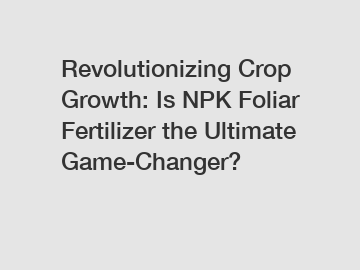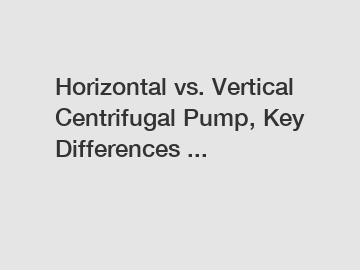Revolutionizing Crop Growth: Is NPK Foliar Fertilizer the Ultimate Game-Changer?
Revolutionizing Crop Growth: Is NPK Foliar Fertilizer the Ultimate Game-Changer?
In the realm of agriculture, the pursuit of innovative methods to enhance crop growth and increase yields has been an ongoing endeavor. Over the years, several advancements have brought about significant improvements in farming practices and fertilization techniques. Among these breakthroughs, NPK foliar fertilizer has emerged as a potentially revolutionary game-changer. With its unique application method, this fertilizer has garnered attention for its ability to efficiently nourish plants and mitigate nutrient deficiencies. In this blog post, we will delve into the realm of NPK foliar fertilizer and explore its potential to transform the agricultural sector.
Foliar fertilizers, as the name suggests, are applied directly to a plant's leaves, bypassing traditional root uptake mechanisms. NPK foliar fertilizer is specifically designed to provide crops with essential macronutrients: nitrogen (N), phosphorus (P), and potassium (K). These three nutrients are vital for plant growth and development, playing crucial roles in processes such as photosynthesis, root development, and overall plant health.

One of the most significant advantages of NPK foliar fertilizer is its ability to rapidly address nutrient deficiencies. Traditional soil fertilization methods often take longer to replenish nutrient levels, as the nutrients need to be absorbed by the roots and transported throughout the plant. In contrast, foliar application allows for quicker nutrient uptake, with the plant's leaves acting as efficient conduits. This speedier nutrient absorption can prove to be a game-changer, especially in cases where crops are experiencing acute deficiencies or facing stressful conditions.
Moreover, NPK foliar fertilizer provides targeted nutrition to specific plant parts, ensuring optimal nutrient distribution. By spraying the fertilizer directly onto the leaves, farmers can bypass the uncertainty associated with soil nutrient availability. This targeted approach also enables farmers to customize nutrient formulations based on crop requirements, optimizing the fertilization process. This precision in nutrient delivery allows plants to absorb essential elements more efficiently, resulting in improved growth, increased yields, and enhanced crop quality.
Apart from addressing nutrient deficiencies, NPK foliar fertilizers can also support crop health by stimulating immune responses and fortifying plants against environmental stressors. Studies have shown that foliar-applied nutrients can enhance a plant's resistance to pests, diseases, and adverse weather conditions. This added layer of protection can be particularly crucial in regions prone to unpredictable weather patterns or where specific pests pose significant threats to crop yields. With NPK foliar fertilizer, farmers can boost their plants' natural defense mechanisms, reducing the need for chemical interventions and promoting sustainable agriculture practices.
Additional reading:The Ultimate Guide to GRP Tanks Maintenance
Unleashing the Power: Top Sponge Filter Upgrades
How do I choose a GFRP tank for my industrial needs?
Foam Filter vs. Canister Filter: Which is Best?
USDA Reintroduces RFID Tag Rule for Cattle | Dairy News
20-325mesh Shale Shaker Screen for Brandt Shale Shaker
What is the role of sedimentation in water treatment?
Furthermore, NPK foliar fertilizers offer flexibility in terms of application timing. Since foliar nutrients are taken up directly by plants, farmers can apply them during critical growth stages or in response to environmental triggers. This adaptability enables farmers to adjust their fertilization practices to suit the plants' evolving needs, ensuring optimal nutrient availability during periods of high demand. By adopting such responsive fertilization strategies, farmers can enhance their crop management practices and maximize productivity.
It's important to note, however, that the efficacy of NPK foliar fertilizer depends on several factors, including crop species, nutrient formulation, application rate, and environmental conditions. Farmers must conduct thorough research, consult with agronomists, and adhere to recommended guidelines to achieve optimal results. Additionally, while NPK foliar fertilizer can be a valuable tool, it should not replace comprehensive soil testing and balanced soil fertility management. A holistic approach that combines soil testing, targeted soil fertilization, and foliar applications is likely to yield the best outcomes in the long run.
In conclusion, NPK foliar fertilizer has the potential to revolutionize crop growth by addressing nutrient deficiencies, enhancing crop health, and optimizing nutrient uptake. With its ability to provide rapid and targeted nutrition, this innovative fertilization technique offers farmers an efficient and flexible tool to boost yields and ensure sustainable agricultural practices. As the agricultural sector continues to evolve, embracing advancements like NPK foliar fertilizer can contribute to increased food production, enhanced crop quality, and a more resilient farming industry overall.
Want more information on sahara exhibition, liquid foliar fertilizer, soluble fertigation fertilizers? Feel free to contact us.
More articles:
The Ultimate Guide to Understanding NPK 15-15-15
Redispersible Polymer Powder Model RD 328
Do Your Laundry This Way and Save Money on ...
What does a welded steel tank hold for you_
Lost foam casting
What is the process of edge banding machine?
Maximizing Efficiency with Cross Flow Cooling Towers
High Efficiency Diffusers vs Surface Aerators
141
0
0
Related Articles
-
121
0
0
-
128
0
0
-
124
0
0
-
134
0
0
-
122
0
0
-
155
0
0
-
135
0
0
-
145
0
0










Comments
All Comments (0)